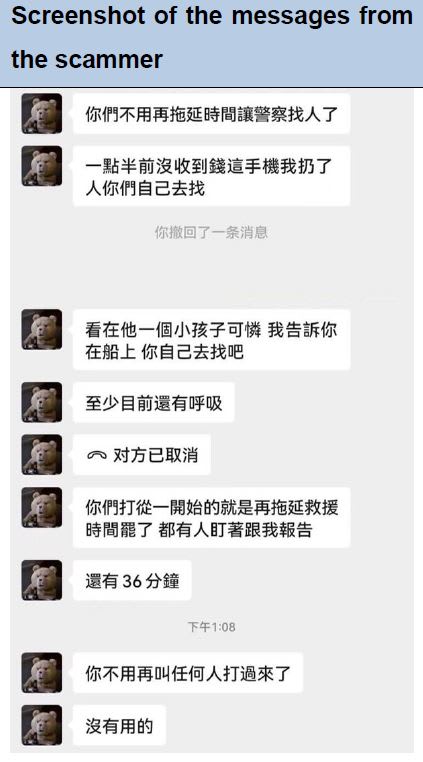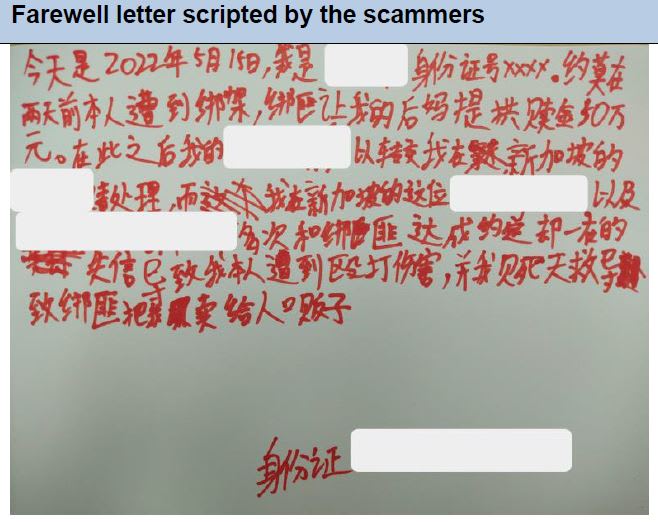Scammers acting as Chinese officials feigned kidnapping of 16-year-old student for ransom
The victim shared with reporters how he was persuaded to cooperate in his own "kidnapping".

Those convicted of cheating can be jailed up to 10 years and fined. (Photo: iStock)
SINGAPORE: When Peter* got a call from the “Immigration and Checkpoints Authority” of Singapore around the end of April saying that he could have fallen foul of the law, he panicked.
What he did not know was that the caller was actually a scammer.
The scammer told Peter that his identity had been used to register for a mobile number in China and the phone number was used to scam victims in Singapore.
The 16-year-old Chinese student, who adopted a pseudonym when he met the media via video call, was then routed to another scammer masquerading as “the China police”, for “investigations”.
“When they told me they were from the authorities and that I was implicated with a scam syndicate, I was scared. I believed at that time that they were real police officers,” he said.
Sharing his experience with reporters on Thursday (May 26) in an interview arranged by the Singapore Police Force, Peter said in Mandarin that the “China police” told him to cooperate with them, and to keep this from his friends and family.
They sent him a photo of his Chinese identity card, one of the ways they managed to convince them that they were indeed from the authorities.
The scammers told Peter that he also received some proceeds from scams they accused him of helping to commit.
Using that as a reason, they asked him to send them RMB260,000 (about S$53,500) to prove his innocence and show that he “didn’t need the money”. They even threatened to deport him back to China if he didn’t send the funds.
Peter tried to ask his mother for the money, using tuition fees and a new laptop as excuses, but his mother refused.
STAGING A KIDNAP
The scammers then got creative, and persuaded Peter to stage a kidnapping. On their instructions, he told his guardian in Singapore, Jenny*, that he was going out to watch a movie in the early evening of May 13.
But he went to Alexandra Hospital to meet one of the scammers, who took Peter’s phone, then passed him a phone and keys to an apartment.
Peter was then told to travel to Changi Airport, then to Marina Bay Sands before ending up at an apartment near Sembawang where he stayed for the next few days.
Jenny, who also used a pseudonym, said that she became worried when Peter didn’t return home by 10.30pm that night, and ignored her earlier messages asking when he would be back.
“Before, if he was going to be back late, he would always send me a message to tell me he will be late,” said Jenny, who added that Peter was a “responsible” teenager.
She called him every hour throughout the night, until the wee hours of Saturday morning, she said. The scammers sent her a message after 8am saying that Peter had been kidnapped.
Jenny, while scared, doubted that this was a real kidnapping. She went to the police despite being told by the scammers not to.
KETCHUP AS BLOOD
Meanwhile, the scammers were getting Peter to stage some videos of him being injured so they could send them to Jenny and his parents, who were in China. Peter said that he used ketchup on his hands and face as blood in the videos.
Jenny, who is in her 50s, said that they felt it was a scam, but were still frightened and anxious. In one of the messages, the scammers said that they will “push him downstairs” in Chinese, which could translate to pushing Peter off a building.
These were the sort of threats the scammers kept sending, she said, but they told the kidnappers they needed time to raise the money.

A screenshot of the messages sent to his family shows threats from the scammers telling them not to go to the police.
They gave the family a time limit to pay the ransom, and said that if it’s not paid in time, “I will throw this handphone away, you can find him yourself”.
One message read: “I pity this child, so I will tell you he is on a boat, you find him yourself. At least he’s still breathing now.”
When the threats and videos failed, the scammers made Peter write a scripted “farewell letter”. In the letter, he wrote that kidnappers asked for a ransom of RMB500,000, and that he will be sold to human traffickers if it is not paid.
Peter later found out that the kidnappers had asked his parents and guardian for ten times the amount in the letter - RMB5 million.

By Monday, when the kidnappers didn’t receive any money, the scammers told Peter to leave. Jenny said that he reached home, safe and sound, at around 4.20pm.
“I was so happy because he was not injured, he was perfectly fine, so I was relieved,” she said.
"TOP 10" SCAM TYPES
Assistant Superintendent of Police (ASP) Gan Ren Jian, senior investigation officer of the Singapore police’s Anti-Scam Command said that empathy is required in such investigations.
The officers maintained constant contact with Peter’s guardian and parents, providing them with regular updates.
“We were aware that the family faced mounting stress and worries during the incident, and that the scammers were able to prey on their fears,” he said.
“So we were fortunate to have gained their trust thereby achieving this positive outcome of no monetary losses and the victim’s safe return.”
He added that China officials impersonation scams remained one of the “top 10” scam types in 2021. From January to March this year, 109 cases of such scam were reported with losses of at least S$14.6 million.
These scams can take different forms, with scammers adopting the identities of law enforcement officers, health ministry officials or other figures of authority.
ASP Gan highlighted that the China police, Interpol and other overseas law enforcement agencies have no jurisdiction to conduct operations in Singapore, arrest anyone or ask members of the public to help with any form of investigations without the approval of the Singapore Government.
*The identities of the victim and his guardian are withheld on their request.
How not to fall prey to scams
The Police advised members of public to take the following precautions when they receive unsolicited calls, especially from unknown parties, especially those with the “+” prefix which originate overseas:
• One of the red flags include calls or messages claiming to be from government agencies, such as the Ministry of Health or Immigration and Checkpoints Authority asking for your personal particulars, bank account details, or OTPs.
• The scammers would employ scare tactics that link you to crimes such as pending court cases, inform you that your mobile number is being used in a crime, or pressure you with urgent requests that require your immediate attention.
• Ignore such calls and the caller’s instructions. No government agency will instruct payment through a telephone call or other social messaging platforms (WeChat or Facebook), or ask you for personal banking information such as your internet banking passwords;
• For foreigners receiving calls from people claiming to be from police in your home country, call your embassy or High Commission to verify the claims of the caller;
• Refrain from giving out your personal information and bank details, whether on the website or to callers over the phone. Personal information and bank details such as internet bank account usernames and passwords, OTP codes from tokens, are useful to criminals;
• Do not make any fund transfers if the caller is of dubious identity;
• Call a trusted friend or talk to a relative before you act. You may be overwhelmed by emotion and err in your judgement; and
• If in doubt, always hang up the call and check with the Singapore Police Force.
• If you have any information related to such crime, please call the police hotline at 1800-255-0000, or dial 999 for urgent police assistance.
• To seek scam-related advice, members of the public may call the anti-scam hotline at 1800-722-6688 or go to www.scamalert.sg.














